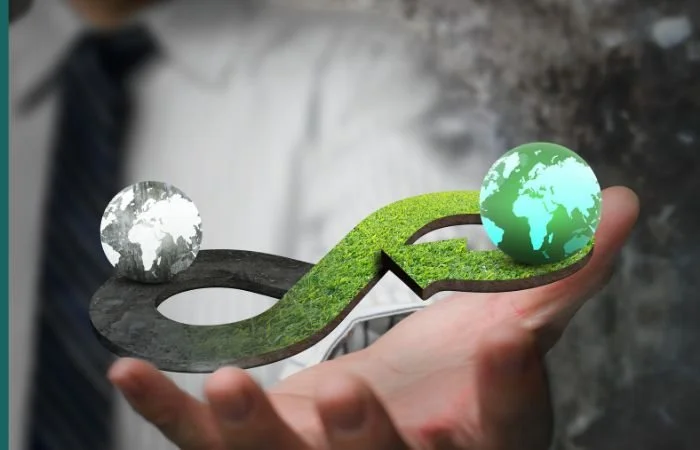The circular economy: How entrepreneurs can round the circle with funding
Socially responsible investing is by no means a new phenomenon, it traces its origins back to the boycotting of apartheid aligned companies and firms heavily involved in big tobacco. But it has evolved through more recent decades, and the E in ESG – the environmental element, has become extremely prescient as we look to avert a human made climate crisis.
It’s a message that has resonated strongly over the course of the pandemic, which has accelerated the trend. Responding quickly to consumer demands; well-funded, traditionally larger firms have poured millions into cleaning up supply chains and making their offerings more circular – reusing and reducing waste. But how can smaller firms, with fewer resources at hand, also contribute to the circular economy? The answer is in innovation and strategic means of accessing funding.
So, what does this mean for entrepreneurs, consumers and those investors who seek to back the success stories of tomorrow?
The circular economy: rising in prominence
Circularity as a theme is a rejection of decades of a “take, make, use, dispose” attitude which has caused well-documented issues ranging from seas full of plastic, landfill sites the size of small cities and a general overabundance of low-quality items that fill our homes. It is driven by years of desiring convenience and ownership combined with a lack of awareness. 2020/21 feels portentous in our shift away from this to a new mantra of “Take, make, use, reuse”. But exactly how is this change occurring, and what form does current innovation take?
Circular products and circular mind-sets
Perhaps most obviously we have Waste to Product, an example being BioBean, using coffee grounds to power London buses, or at the more extreme end of the scale, there are companies like Chip[s] Board who take McCain’s peelings and turn them into bio-plastics for buttons and eyewear.
We’ve also seen numerous businesses aim to enable communities to collectively reduce waste and unnecessary product purchases for one-off/limited use. Prime examples of this include Olio and Fat Llama, both of whom have received funding from some of Europe’s top venture capitalists, providing funds to help drive awareness and engagement.
Thinking more laterally, given e-commerce has increased in the percentage of our total shopping, businesses that facilitate more efficient delivery and returns, both in terms of the transport and packaging, will take on greater significance in reducing the impact of the convenience that comes from online shopping.
Less obvious but perhaps more interesting is the “Product as a Service” trend. It moves us away from the dictum of ownership is best, to acknowledging that we can, as a society, massively increase the utilisation of our assets by consuming them only as we need them, structurally addressing the issue of waste whilst providing an improved customer service.
A prime example of this is the electronics market and specifically phones/tablets. They are enormously powerful pieces of technology that often are discarded after we upgrade to the newer model, possibly sold second hand but more likely thrown into the cupboard alongside miscellaneous USB cables and the charger for your long-forgotten FitBit. Companies like Raylo are addressing that by designing their business model around the philosophy of recycling your phone, not just removing the friction that exists for consumers looking to move on old devices but doing so with a high-quality customer experience.
The question of funding
Product as a service is a hugely exciting area and one that we think will grow. As an advisor, it is also an area that offers an interesting challenge from a funding perspective, with the companies requiring both the funding to grow the brand, but also requiring potentially significant capital to grow their base of assets (bikes, phones, etc…) which is more suited to debt. Getting this balanced funding right is crucial in enabling the company to grow without restrictions.
In order for these companies to make the transition from being an emerging trend to a leading player in their sector, they’ll need to raise significant funds. Specialist funds such as Bridges, Palatine Impact, Nesta and Circularity Capital are increasing in number but remain somewhat thin on the ground. One possible explanation for this may be from a historical perception that Impact Investing was synonymous with poorer financial returns, despite there being empirical evidence that isn’t accurate.
Moving forward, we expect more funds to emerge that explicitly seek companies in the wider ESG/Impact space as newer generations look to invest money in funds that align with their values. We also anticipate a shift from generalist investors to look for these types of opportunities.
The big question for entrepreneurs and start-ups is whether those generalist funds can match what the specialist ones provide, given the latter’s greater experience in the sector. Our experience would suggest that the terms, the personalities and the ability to help deliver the business plan carry similar weight when an entrepreneur chooses a backer, so even if an investor has a head start by virtue of a well-aligned mandate, it’s no guarantee of success in a competitive process.








